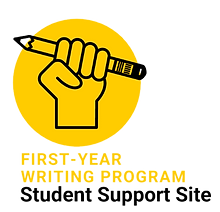the five
core values

what makes someone a successful writer?
It is common to assume that that successful writers are “just born with” superior writing skills, and that successful writing means doing a particular set of tasks well: we often associate successful writing with “smart-sounding” sentences, proper use of grammar, clear thesis statements, and writing that “flows” (whatever that means...)
However, in the First-Year Writing Program, we do not equate successful writing with a To Do list of tasks. Instead, our goal is to help students develop useful and productive ways of thinking about writing.
THE FIVE CORE VALUES =
USEFUL & PRODUCTIVE WAYS
OF THINKING ABOUT WRITING
habits
mind
of
These "useful and productive ways of thinking about writing" can also be understood as habits of mind.
A habit is a behavior that has been expressed so often that it becomes routine or automatic. Something becomes a habit when you don’t need to be reminded to do it. “Habits of mind,” then, are ways of thinking that have become habitual, or automatic.
First-Year Writing Program courses are designed to present you with repeated opportunities to practice these ways of thinking, so that in the future, they will become habitual. You’ll approach future writing tasks with these understandings in mind, without even having to think about them.
What are these five “habits of mind,”
and where do they come from?
The Rowan First-Year Writing Program’s five Core Values are informed by extensive research in the field of composition and rhetoric, and they align with research outcomes and objectives for First-Year Writing Programs that have been established by the Council of Writing Program Administrators (CWPA), the National Council of Teachers of English (NCTE), and the National Writing Project (NWP). These national organizations of scholars have agreed on a series of “habits of mind” that are associated with successful college and post-college writing (in other words, things that successful college writers know and are able to put into practice, regardless of their major or area of study).
THE FIVE CORE VALUES:
The five Core Values are consistent across all FYW courses. However, the learning objectives for each of the Core Values are distinct for each course. As you move through the First-Year Writing program sequence, your understanding of the five Core Values will expand and develop. In CCII, for instance, you will be expected to demonstrate a more sophisticated understanding of each Core Value than you demonstrated in CCI.
Use the dropdown menu below to learn more about each of the Core Values. You can access the learning objectives for each FYW course in the specific course sections. To see how the learning objectives for each Core Value evolve over time, view this printable chart.
HOW DO THE
FIVE CORE
VALUES
RELATE TO MY
grade?
Students present portfolios at the end of each semester. Every portfolio includes a Reflective Statement, a formal document in which you reflect on your development of the five Core Values over the course of the semester. Your instructor will evaluate your Reflective Statement and your portfolio writing projects, to determine how well you have met the learning objectives of each Core Value.
Upon completion of the First-Year Writing Program course sequence, you should fully understand the five Core Values.